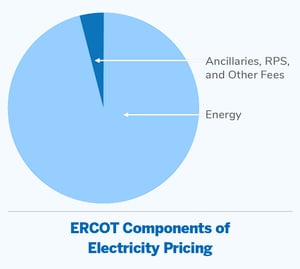Energy Procurement | January 24, 2024
Lubbock, Texas - Guide to Electricity Choice
While you now get to choose who provides your electricity, the grid in Texas is still managed by the Electric Reliability Council of Texas (ERCOT), which provides a central location where energy is dispatched to the grid. It keeps the markets running, no matter who you choose as your retail electric provider.
Regulated vs. Competitive Energy Markets
There are two types of energy markets: regulated and competitive.
Regulated
In a regulated market, a single utility has an exclusive franchise to provide electricity to customers in its region. The customer has little control over rates, which are all approved by the Public Service Commission (PSC). Customers also take on the risk of generation investments in regulated markets.
Competitive
In a competitive market, customers can choose their retail electric provider and contract with them at negotiated prices and terms that reflect market conditions. With more options available, customers can also choose a plan that works best for them.
Benefits of Retail Electric Competition
The deregulation of the energy industry and competition among retail electric providers can offer several benefits to customers, including the following:
Better Service
Because of increased competition, retail electric providers are more motivated to offer excellent service.
Energy Efficiency
You can choose to be more energy efficient by selecting a retail electric provider with sustainable product offerings.
Energy Education
You can develop a better understanding of your energy costs by evaluating different plans.
New and Enhanced Services
Competitive retail electric providers often offer additional services and benefits that would otherwise be unavailable.
Plan Types
There are three popular types of electricity plans in Texas.
Fixed-rate Electricity Plans
Allow customers to lock in a price per unit for the duration of their contract — for people who want budget certainty.
Index Electricity Plans
Incorporate a price per unit that can change based on demand, seasonality, and other factors — for people who prefer to take advantage of market opportunities by not locking in a fixed price.
Managed Electricity Plans
Managed plans may include fixed and variable components to achieve a blended, or dollar cost averaged, electricity price. By deploying a managed, or layered electricity purchasing strategy, energy buyers can effectively manage risk and price. A managed strategy can take a variety of forms — from simple and manual, to complex and automated — and is for people who want to play an active role in buying portions of future electricity usage.

Understanding Your Bill
In a competitive market, an electric bill has various components that are “bundled” in regulated markets. These include:
Charges from the Generation Supplier
Generation Charges
Costs for the generation of electricity.
Transmission Charges
Tariff cost to move electricity from power plant to utilities, governed by the Public Utility Commissions of Texas (PUCT). Charges from the Local Utility
Charges from the Local Utility
Delivery Charges
Tariff cost to deliver electricity, governed by the state commission.
Energy
The cost of procuring the actual electrons transmitted through the transportation and distribution (T&D) lines. ERCOT is an energy-only market, and the cost of energy represents 96% of what a customer pays for electricity.
Ancillaries, RPS, and Other Fees
In aggregate these account for approximately 4% of a customer’s electricity price. Ancillaries are small administrative charges billed to load-serving entities by the Regional Transmission Organization (RTO) to operate the grid safely and reliably. This includes ERCOT fees such as Reliability Must Run (RMR), Firm Fuel Supply Service (FFSS), etc.
Renewable Portfolio Standards (RPS)
Mandates set by individual states for load-serving entities (LSE’s) to purchase a certain amount of renewable energy. Determined by state-regulated compliance percentages and the financial market for renewable energy certificates (RECs).
Other Fees
Include main, other load fees, and services.
How to Buy Electricity
One size doesn’t fit all when it comes to developing a customized electricity purchasing strategy. It’s important to consider your unique usage profile, risk tolerance, and budget goals. Your electricity strategy could include a variety of products, each with its own characteristics.
To make sure you’re buying electricity in a way that works for you, choose a retail electric provider you trust and work with them to develop your customized strategy.
In addition to traditional procurement means, mantis offers Procure, our proprietary Reverse Auction Platform, Mantis helps businesses, government agencies, schools, and all types of organizations procure the lowest possible electricity and natural gas rates.
You Have the Power to Choose
As a business located in Lubbock, you get to choose who you buy your electricity from, what type of plan you want, the timing of your purchases, and how those purchases are executed.
What to Look for In a Retail Electric Provider
Choosing a retail electric provider may seem daunting. Rest assured, Mantis simplifies the process and is here to help.
Here are some questions to keep in mind:
- Is the retail electric provider licensed in your state?
- What are the costs compared to what you currently pay?
- What is the retail electric provider’s history and reputation?
- What type of customer service does the retail electric provider offer? Does the retail electric provider offer clean energy solutions?
- Was all of the above information readily available and clearly communicated?
To learn more about the benefits of a broker vs supplier click here.
Related Posts
Discover more content and insights from Mantis Innovation

The Cost of Inaction: Why Businesses Should Act Now on Energy Efficiency
In today's fast-paced business environment, the financial and operational losses businesses incur by delaying energy efficiency improvements, the "cost of inaction," is more relevant than ever.

Navigating Energy Procurement: Strategies to Manage Risk
When procuring energy for your commercial business, it can be difficult to weigh the risks associated with buying strategies. How do you know your procurement strategy is the right one? How

6 Facts about Energy Services in Efficiency Projects
As a nationwide firm with design/build capabilities, we identify, design, and deliver efficiency projects for clients across the United States. These projects are rooted in several core energy

PJM Capacity Auction Results: A Surge in Prices and Its Implications
PJM recently released the capacity auction results at the end of July for the period of June 2025 through May 2026, and the outcomes have been much higher than most anticipated. This surge in prices